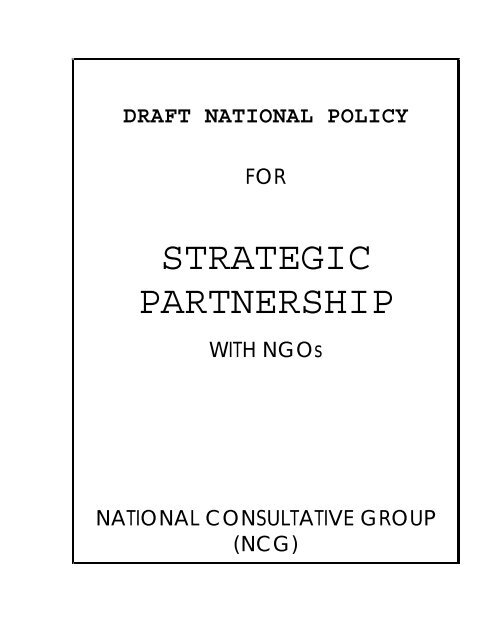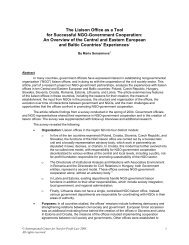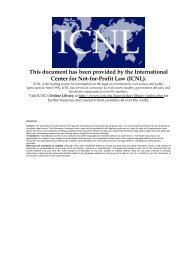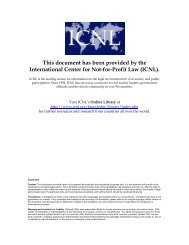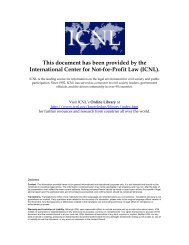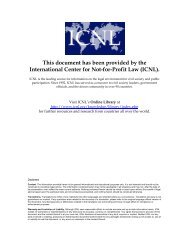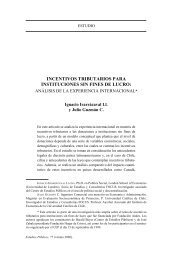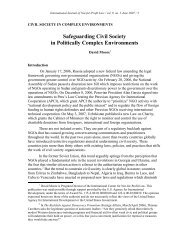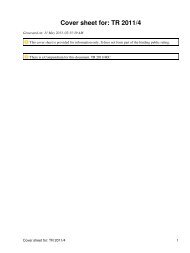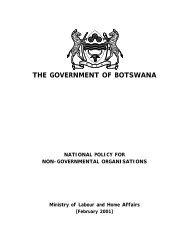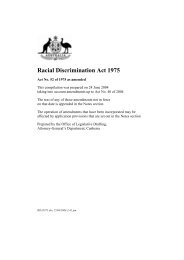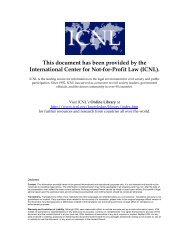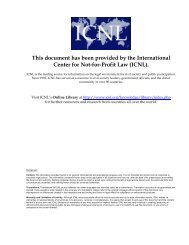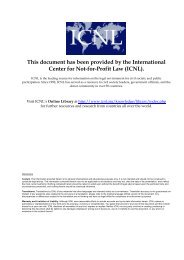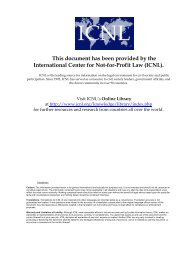Draft National Policy for Strategic Partnership with NGOs - The ...
Draft National Policy for Strategic Partnership with NGOs - The ...
Draft National Policy for Strategic Partnership with NGOs - The ...
Create successful ePaper yourself
Turn your PDF publications into a flip-book with our unique Google optimized e-Paper software.
DRAFT NATIONAL POLICY<br />
FOR<br />
STRATEGIC<br />
PARTNERSHIP<br />
WITH <strong>NGOs</strong><br />
NATIONAL CONSULTATIVE GROUP<br />
(NCG)
TABLE OF CONTENT<br />
FORWARD 1<br />
1.0 EXECUTIVE SUMMARY 3<br />
2.0 POLICY RATIONAL STRATEGIC PARTNERSHIP 5<br />
2.1 Goals of the <strong>Policy</strong> 5<br />
2.2 Objectives of the 6<br />
2.3 <strong>Policy</strong> Strategies 6<br />
2.4 Framework of <strong>Partnership</strong> 6<br />
2.4.1 Domain of the <strong>Strategic</strong> <strong>Partnership</strong> 6<br />
2.4.2 Principles of <strong>Partnership</strong> 7<br />
2.4.3 Rights and Duties of the <strong>Strategic</strong> Partners 7<br />
2.4.4. Legal framework 9<br />
2.4.4.1 Definition of <strong>NGOs</strong> and their Activities 9<br />
2.4.4.2 Registration 9<br />
2.4.4.3 Taxation and Exemption 10<br />
2.4.4.4 Funding and Accountability 11<br />
2.5 Institutional Framework 11<br />
3.0 GOVERNANCE RELATIONS 13<br />
3.1 Relations Among <strong>NGOs</strong> 13<br />
3.2 Relations <strong>with</strong> State Institutions and Agencies 14<br />
3.3 Relations <strong>with</strong> District Assemblies 14<br />
3.4 Relations <strong>with</strong> Donors 15<br />
4.0 POLICY DEVELOPMENT AND CONSULTATIONS 15<br />
APPENDIX A<br />
Resolution of the <strong>National</strong> Conference on <strong>Draft</strong> <strong>Policy</strong> …… 17<br />
APPENDIX B<br />
Background to the <strong>National</strong> <strong>Policy</strong> 19<br />
1.0 NEED FOR COHERENT POLICY FRAMEWORK 19<br />
2.0 SITUATION ANALYSIS 19<br />
2.1 Evolution of Government – NGO relations 19<br />
2.2 Factors Undermining Relations 19<br />
2.2.1 Government Concerns Include 19<br />
2.2.2. <strong>NGOs</strong> are Concerned that 20<br />
2.3 <strong>Policy</strong> and Organisational Responses to the Issues 20<br />
2.3.1 Government’s Measures Included 20<br />
2.3.2 <strong>NGOs</strong> Responded to the Concerns by 20
2.4 Review of the Legal Framework 20<br />
2.4.2 Trustees (Incorporation) (Amendment) Law, 1993 21<br />
2.4.3 Constitution of the Republic of Ghana 1992 21<br />
2.4.4 Cabinet Directives 21<br />
2.5 Review of the Institutional Framework 22<br />
3.0 DIALOGUE AS STRATEGY FOR RESOLVING THE ISSUES 22<br />
3.1 Government’s Initiative 23<br />
3.2 <strong>NGOs</strong> Initiative 23<br />
3.3 Joint Consultation Process 23<br />
APPENDIX C<br />
NATIONAL POLICY AND FRAMEWORK FOR PARTNERSHIP<br />
WITH NGO / GOG JOINT national CONFERENCE 24<br />
APPENDIX D<br />
MEMBERS OF THE NATIONAL CONSULTATIVE GROUP (NCG) 26<br />
APPENDIX E<br />
IDEG CONSULTING TEAM 27<br />
APPENDIX F<br />
NGO / GOG JOINT NATIONAL CONFERENCE 28<br />
DINNER 29
FORWARD<br />
<strong>The</strong> past decade, in particular, has been a period of exponential growth of Non-Governmental<br />
Organisations (NGO) in Ghana. <strong>NGOs</strong> have grown in both numbers and range of activities and in<br />
positive response to the challenges and opportunities of reducing poverty, promoting human<br />
development and strengthening democratic governance in the country. Across the broad spectrum of<br />
life, <strong>NGOs</strong> have initiated projects in aid of marginal and deprived groups in rural and urban communities<br />
and participated in other programmes aimed at promoting social change and development at<br />
community, districts, regional, national and international levels.<br />
<strong>The</strong>se evolving roles and activities have endeared <strong>NGOs</strong> to individuals, groups and communities, as<br />
well as to government agencies and international organisation. <strong>The</strong>y have strengthened national and<br />
global recognition of <strong>NGOs</strong> as significant agents of human development and democracy. In the specific<br />
context of Ghana, <strong>NGOs</strong> are working to enhance our national development assets as they mobilise<br />
financial, material and human resources at local and external levels in support of social and economic<br />
development that adequately includes the needs of grass root communities -urban and rural.<br />
In pursuit of its mandate and responsibilities <strong>for</strong> national development, the Government of Ghana will<br />
promote “durable partnerships” <strong>with</strong> civil society organisations so that their enormous potential as<br />
agents of social change and development will be fully realised. This <strong>National</strong> <strong>Policy</strong> on <strong>Strategic</strong><br />
<strong>Partnership</strong>s <strong>with</strong> <strong>NGOs</strong> has, accordingly, been <strong>for</strong>mulated to create an enabling environment <strong>for</strong><br />
building “co-operative relationships” and, possibly, “durable partnerships” between <strong>NGOs</strong> and the<br />
Government of Ghana.<br />
Between November 1999 and October 2000, a <strong>National</strong> Consultative Group constituted by the<br />
representatives of Government and <strong>NGOs</strong> worked together to develop the proposals <strong>for</strong> this policy.<br />
<strong>The</strong>y supervised the preparation of a common document in which issues of policy and proposals <strong>for</strong><br />
their resolution were presented. <strong>The</strong>reafter, extensive consultations were held on the document <strong>with</strong><br />
stakeholders at local and national levels in the months of August and October 2000. Through these<br />
consultations broad-based support was mobilised <strong>for</strong> the proposals as alternative proposals were<br />
canvassed. <strong>The</strong> consultative workshops then adopted resolutions that invariably expressed support <strong>for</strong><br />
the process and outcomes of the consultation on national NGO policy. Copies of the resolutions are<br />
presented as appendix B of this document. Appendix A presents the background to this policy initiative,<br />
highlighting the issues and attempts at resolving them in the past. <strong>The</strong> policy, as presented below,<br />
defines (a) the vision, principles, and objectives of the desired relationship, and (b) delineate the<br />
strategies needed to attain the objectives in the long term. <strong>The</strong> proposals were endorsed after thorough<br />
deliberations at a national conference held on 25-26 October 2000.<br />
This “joint-action” consultation process might in the long term be of even greater value than the physical<br />
end result in the <strong>for</strong>m of this paper. <strong>The</strong> broad-based consultative and participatory approach used in<br />
producing this draft policy document has undoubtedly helped in improving relations between the<br />
Government and <strong>NGOs</strong> since the two actors disagreed in 1995 on the nature of national policy required<br />
<strong>for</strong> regulating their relations. <strong>The</strong> disagreement marred relations between Government and <strong>NGOs</strong> <strong>for</strong><br />
almost half a decade making it difficult <strong>for</strong> dialogue to progress to the point of negotiating and making<br />
compromises to resolve the regulatory issues. <strong>The</strong> inclusive, participatory and democratic nature of the<br />
consultation process indeed facilitated true dialogue creating a constructive environment <strong>for</strong> resolving<br />
the “critical issues” of disagreement in the past and, thereby, opened a fresh chapter in the relations<br />
between the Government and <strong>NGOs</strong>.<br />
All those who contributed to making this remarkable process successful deserve to be commended.<br />
Notable among the contributors are Hon. Alhaji Muhammad Mumuni, Member of Parliament and ex-<br />
Minister of Employment and Social Welfare, and members of the <strong>National</strong> Consultative Group (NCG)<br />
that worked voluntarily and tirelessly mediated conflicting opinions and bringing this process to a good<br />
end. <strong>The</strong> other contributors are IDEG as the consulting organisation that provided several draft versions<br />
of the discussion papers and also facilitated the various consultation workshops, and the participants
from the Government and NGO sides who <strong>with</strong> great devotion defended not only their own but above all<br />
their mutual interests.<br />
We would also like to express our gratitude to the various organisations and institutions that generously<br />
sponsored the consultation process. <strong>The</strong>se include the:<br />
Ministry of Employment and Social Welfare<br />
SNV/Netherlands Development Organisation<br />
World Bank<br />
UNDP/NIRP<br />
Royal Netherlands Embassy<br />
Action Aid<br />
CARE International<br />
DFID<br />
Plan International<br />
CAF West Africa<br />
We hope that the spirit of the consensus, goodwill and partnership that is evolving between <strong>NGOs</strong> and<br />
the Government of Ghana will flourish to the benefit of our national development ef<strong>for</strong>ts and in<br />
strengthening democracy and good governance in Ghana.<br />
We urge the Government of Ghana to adopt and effectively implement the proposals contained in the<br />
draft policy document so that relations of co-operation and strategic partnerships between Government<br />
MDAs, <strong>NGOs</strong>, local communities and donors would become a solid reality beneficial to all stakeholders.<br />
Mr. George Ahadzie Mrs Bridget Katsriku Mr Kofi Adu<br />
NCG Chairman Government Representative NCG Secretary
1.0 Executive Summary<br />
<strong>The</strong> Government of Ghana seeks to <strong>for</strong>ge a strategic partnership <strong>with</strong> <strong>NGOs</strong> and other stakeholders<br />
operating in the ‘non-profit sector’ so that its long-term development goals would be pursued more<br />
vigorously and achieved <strong>with</strong> the effective support of all parties. <strong>The</strong> partnership would be strategic<br />
insofar as it is developed in a manner that consciously takes advantage of the unique capabilities of<br />
<strong>NGOs</strong> to accelerate and sustain social and economic development and strengthen democratic<br />
governance in the long term in Ghana.<br />
Against the backdrop of a situational analysis of the evolution of Government-NGO relations in the past<br />
decade or more, key issues that have so far impeded co-operative and partnership relations between<br />
the two actors are identified. Among the issues discussed in the background section of this document<br />
(Appendix B), the need to clarify the goals and objectives of national policy and <strong>for</strong>mulate good<br />
strategies <strong>for</strong> their effective attainment is emphasised. Drawing on published and unpublished sources,<br />
including the national development policy framework, the Constitution of the Fourth Republic of Ghana<br />
(1992), and NGO documents, the vision, principles and objectives of the co-operative and partnership<br />
relationship to which the Government and <strong>NGOs</strong> and other stakeholders aspire are defined.<br />
<strong>The</strong>reafter, issues of establishing an appropriate framework <strong>for</strong> the practical pursuit and attainment of<br />
the goals and principles are addressed. This involves specifying the non-profit sector as the public<br />
domain of the strategic partnership together <strong>with</strong> the principles, rights and duties of the actors involved<br />
using Chapters 5 and 6 of the 1992 Constitution.<br />
Special attention is given to designing an appropriate legal and institutional framework that is in<strong>for</strong>med<br />
by the limitations of the existing setting <strong>for</strong> NGO operations and seeks to improve upon them. An<br />
argument is made <strong>for</strong> the creation of a more coherent framework that links national and local spheres of<br />
operations and promotes relations of co-operation and partnership between Government MDAs and<br />
<strong>NGOs</strong> as well as communities. <strong>The</strong> proposals made cover the definition, classification, registration and<br />
taxation as well as the funding and accountability of <strong>NGOs</strong>.<br />
In addition to the legal framework, the institutional framework has also been duly considered. <strong>The</strong><br />
establishment of an independent and financially autonomous <strong>National</strong> Commission on <strong>NGOs</strong> (NCNGO)<br />
that would enable the operations of <strong>NGOs</strong> in the non-profit sector to be jointly steered by the<br />
Government and <strong>NGOs</strong> together <strong>with</strong> other stakeholders is recommended. <strong>The</strong> mode of constituting the<br />
membership of the NCNGO is specified <strong>with</strong> its functions, secretariat and funding.<br />
<strong>The</strong> document further discusses the nature of governance relations that should exist among and<br />
between the stakeholders. It looks at how relations among <strong>NGOs</strong> and state institutions and <strong>with</strong> District<br />
Assemblies and donors can be developed to reflect the letter and spirit of co-operation and partnership.<br />
Finally, the policy deals <strong>with</strong> the undertakings required of each stakeholder in the strategic partnership.<br />
<strong>The</strong> range of issues addressed by this draft national policy is broad enough to accommodate the<br />
concerns of the multiplicity of stakeholders who are not only interested in promoting sustainable and<br />
equitable national development but also strengthening participatory democratic governance in Ghana.<br />
In that regard, the policy makes an important contribution to the creation of a more coherent institutional<br />
framework and enabling environment <strong>with</strong>in which the Government and <strong>NGOs</strong> can improve their<br />
relations and strengthen collaboration and partnership between them.<br />
<strong>The</strong> proposals upon which this policy is derived were discussed and refined by representatives of the<br />
major stakeholders who deliberated upon the text and content of earlier drafts of this document that<br />
were presented to the zonal and national workshops where they were unanimously endorsed. In order<br />
to shed more light on the policy recommendations, the situational analysis that provides a background<br />
to the proposals is presented in Appendix B of this document.
2.0 <strong>Policy</strong> rationale: <strong>Strategic</strong> <strong>Partnership</strong><br />
<strong>The</strong> Government of Ghana seeks to <strong>for</strong>ge a strategic partnership <strong>with</strong> <strong>NGOs</strong> and other stakeholders<br />
operating in the ‘non-profit sector’ in order to achieve its long-term development goals. <strong>The</strong> fund-raising<br />
skills of local and international <strong>NGOs</strong> including their ability to mobilise people and technical resources in<br />
support of community development provide them a comparative advantage in articulating and<br />
responding to the needs of the grassroots <strong>with</strong> relative speed and flexibility. In working to meet the<br />
welfare and developmental needs of the poor and voiceless, while promoting social integration, equality<br />
and democracy, <strong>NGOs</strong> would be encouraged to draw on their capabilities to accelerate and sustain the<br />
social and economic trans<strong>for</strong>mation of Ghana into a middle-income just and free society.<br />
<strong>Partnership</strong> <strong>with</strong> the <strong>NGOs</strong> will be strategic in two senses. Firstly, it will draw on the relative capabilities<br />
of each party to advance democracy, good governance and national development in a manner that is<br />
both complementary and mutually beneficial to both parties. Secondly, the relationship is strategic<br />
because of its long-term orientation. Creating opportunities and enabling conditions <strong>for</strong> trans<strong>for</strong>ming the<br />
conditions that perpetuate poverty and deprivation, powerlessness, ignorance and exclusion in Ghana<br />
is an important task that will be better attained in the long, rather than the short term. Systematic steps<br />
will be taken to improve relations and strengthen the foundations <strong>for</strong> future strategic partnerships.<br />
2.1 Goals of the policy<br />
In promoting the strategic partnership, Government would work together <strong>with</strong> <strong>NGOs</strong> to pursue and<br />
attain the objectives of national development policies, programmes and projects. <strong>The</strong> goals to be<br />
attained by year 2020 are:<br />
• Higher rates of investment, employment and growth<br />
• Reduction of poverty and ultimate elimination of hard core poverty<br />
• Equitable distribution of the benefit of development<br />
• Sustainable human development through improvement in the management of the environment<br />
• Good democratic governance<br />
<strong>The</strong>se goals would be pursued in a manner that enhances the building of a free and just society as<br />
envisioned in the Constitution of Ghana (1992).<br />
2.2 Objectives of the policy<br />
<strong>The</strong> national policy would have as its objectives the:<br />
• Recognition of <strong>NGOs</strong> as strategic partners in national development and democratisation<br />
• Creation of an enabling legal, institutional and democratic environment <strong>for</strong> <strong>NGOs</strong> to operate and<br />
contribute effectively to national development<br />
• Establishment of a framework <strong>for</strong> consultations on issues that affect the effective governance of<br />
NGO activities in the non-profit sector and how to resolve them<br />
• Promotion of collaboration between Government, <strong>NGOs</strong> and other stakeholders to improve<br />
relations and enhance the pursuit and attainment of individual and collective national development<br />
goals<br />
2.3 <strong>Policy</strong> strategies<br />
<strong>The</strong> strategy <strong>for</strong> pursuing the above goals and objectives in the long term shall involve the:<br />
• Clear definition of the framework of partnership including the domain, principles and rights of the<br />
strategic partners<br />
• Recognition of <strong>NGOs</strong> as legally registered entities that play legitimate roles in national development<br />
and democratisation and can sue and be sued
• Creation of a coherent, legal, and institutional framework <strong>for</strong> effective operation of <strong>NGOs</strong> at<br />
national, regional, district and community levels<br />
• Formulation of standard and simplified rules, regulations and procedures <strong>for</strong> registration and joint<br />
regulation of operations of <strong>NGOs</strong><br />
• Facilitation of the development of NGO networks to enhance co-ordination of their participation in<br />
the implementation of the policy and evaluation of its outcomes monitoring and co-ordination of<br />
their activities, and improve transparency and accountability practices<br />
2.4 Framework of partnership<br />
<strong>The</strong> framework of partnership shall comprise the following:<br />
2.4.1 Domain of the strategic partnership<br />
<strong>The</strong> domain of partnership between Government and the <strong>NGOs</strong> would be broadly defined as the nonprofit<br />
sector. This is an emerging field of activity located <strong>with</strong>in the multiple sectors of the public arena<br />
where goods and services, including training, research, advocacy and lobbying are delivered primarily<br />
<strong>for</strong> social and humanitarian purposes, rather than <strong>for</strong> individual or group profit. In contrast to the private<br />
sector, the non-profit sector is organised on the following principles:<br />
• Services are rendered or goods delivered in the interest of the general public, or a significant<br />
section of it, including the membership of the organisation<br />
• Revenue generated in the production and delivery of services or related public goods as net of<br />
salaries and operational costs will not be distributed as ‘profit’, ‘dividends’ or ‘excess compensation’<br />
to individual founders, trustees or members of the management board of the organisation<br />
• Transaction costs of non-profit operations may be covered partly through immunities and privileges<br />
granted by the State in the <strong>for</strong>m of specified tax exemptions and subventions or as grants and<br />
donations from corporate firms or individual philanthropists<br />
<strong>The</strong> non-profit sector has become a prime area of ‘donor investment’ in social goods, equal opportunity<br />
and poverty reduction programmes, offering employment opportunities to several thousands of people.<br />
Although the lack of data makes outright determination of the exact size of the sector difficult, it is<br />
widely perceived to be contributing to economic growth and social development. <strong>NGOs</strong> are prominent<br />
actors in the not-<strong>for</strong>-profit sector, joining other civil society organisations and groups, donors, corporate<br />
firms and state institutions to promote sustainable national development. <strong>National</strong> policy would seek to<br />
facilitate the effective operations of <strong>NGOs</strong> and other civil society organisations in the public not-<strong>for</strong>-profit<br />
sector.<br />
2.4.2 Principles of partnership<br />
<strong>Strategic</strong> partnership between the Government of Ghana and <strong>NGOs</strong> will be guided by a set of principles<br />
that should be upheld at all levels of work in the development process. <strong>The</strong> principles on which the<br />
relationship will be based are:<br />
• Mutual recognition and respect <strong>for</strong> their different and complementary roles, values and objectives in<br />
the collective task of building a free and just society<br />
• Collaboration in the mobilisation of internal and external resources to promote common goals and<br />
mutually beneficial outcomes<br />
• Parity in openness and trust towards each other in dialogue and consensus building<br />
• Pool resources together and share responsibilities <strong>for</strong> outcomes while observing distinct<br />
accountability, reciprocal obligations and learning from each other<br />
2.4.3 Rights and duties of the strategic partners<br />
<strong>The</strong> rights and duties of the strategic partnership derive from the Constitution of the Republic of Ghana<br />
(1992), specifically Article 21 (1)(a-e) of Chapters 5 and Article 37 (1), (2)(a)(b), and (3) of Chapter 6.<br />
Article 21 stipulates that:<br />
(1) “All persons shall have the right to<br />
(a) Freedom of speech and expression, which shall include freedom of the press and other<br />
media
• Freedom of thought, conscience and belief, which shall include academic freedom<br />
• Freedom to practise any religion and to manifest such practice<br />
• Freedom of assembly including freedom to take part in processions and<br />
demonstrations<br />
• Freedom of association, which shall include freedom to <strong>for</strong>m or join trade unions or<br />
other associations, national and international, <strong>for</strong> the protection of their interests<br />
• In<strong>for</strong>mation, subject to such qualifications and laws as are necessary in a democratic<br />
society;<br />
• Freedom of movement which means the right to move freely in Ghana, the right to<br />
leave and to enter Ghana and immunity from expulsion from Ghana<br />
Article 37 stipulates that:<br />
“(1) <strong>The</strong> State shall:<br />
• Endeavour to secure and protect a social order founded on the ideals and principles of freedom,<br />
equality, justice, probity and accountability as enshrined in Chapter 5 of [the] Constitution; and<br />
• In particular direct its policy towards ensuring that every citizen has equality of rights, obligations<br />
and opportunities be<strong>for</strong>e the law<br />
(2) <strong>The</strong> State shall enact appropriate laws to assure –<br />
• <strong>The</strong> enjoyment of rights of effective participation in development processes including rights of<br />
people to <strong>for</strong>m their own associations free from state interference and to use them to promote and<br />
protect their interests in relation to development processes; rights of access to agencies and<br />
officials of the State necessary in order to realise effective participation in development processes;<br />
freedom to <strong>for</strong>m organisations to engage in self-help and income-generating projects; and freedom<br />
to raise funds to support those activities;<br />
• <strong>The</strong> protection and promotion of all other basic human rights and freedoms, including the rights of<br />
the disabled, the aged, children and other vulnerable groups in development processes<br />
(3) In the discharge of the obligations stated in clause (2) of this article, the State shall be guided by<br />
international human rights instruments which recognise and apply particular categories of basic human<br />
rights to development processes”<br />
<strong>The</strong>se rights also subsume duties of citizenship and participation as stipulated in the 1992 Constitution.<br />
2.4.4. Legal framework<br />
<strong>The</strong> legal framework defines <strong>NGOs</strong> and their range of activities and stipulates the conditions <strong>for</strong> their<br />
registration as legal entities and attendant privileges under the law.<br />
2.4.4.1 Definition of <strong>NGOs</strong> and their activities<br />
<strong>NGOs</strong> in Ghana are defined as civil society organisations that are <strong>for</strong>med independently of the State<br />
but register voluntarily under specified laws in order to gain official recognition to pursue purposes that<br />
are not self-serving but oriented towards public benefit. Such registration qualifies <strong>NGOs</strong> to access<br />
public development funds, be it from external donors or Government MDAs, and/or benefit from tax<br />
exemptions and account <strong>for</strong> their usage in their operations in the non-profit sector. <strong>NGOs</strong> in Ghana may<br />
be national as well as international; secular as well as faith-based; and membership or nonmembership<br />
based. <strong>The</strong>y operate in fields such as health, education, rural and urban development,<br />
environment, population and social welfare.<br />
<strong>NGOs</strong> are also involved in employment creation, micro-credit/financing, economic development, skills<br />
training, gender awareness and action, peace and human rights, in<strong>for</strong>mal economic activity, anticorruption,<br />
poverty reduction and advocacy on policy re<strong>for</strong>ms. <strong>The</strong>y may operate across sectors,<br />
regions and at the centre in their service to the community, the deprived and underprivileged as well as<br />
the general public. <strong>NGOs</strong> are not homogeneous actors. <strong>The</strong>y differ in activities, structure, organisation,<br />
resources, leadership, membership, ideology and aspirations. An appropriate system of classification<br />
shall be designed to enhance the identification of <strong>NGOs</strong> and their core activities. Such a system would<br />
also facilitate professional monitoring of their operations and related trends.
2.4.4.2 Registration<br />
Civil society organisations seeking to be recognised as <strong>NGOs</strong> and operate as such shall first register<br />
<strong>with</strong> the officially designated body mandated to per<strong>for</strong>m this function, i.e. the <strong>National</strong> Commission on<br />
<strong>NGOs</strong> (NCNGO). Registration will be decentralised to the district level where local organisations<br />
including community-based organisations (CBO) will register. Registration at the district level will be<br />
effectively co-ordinated at the national level by the NCNGO. <strong>National</strong> and international <strong>NGOs</strong> shall<br />
register at the national level but will be required to in<strong>for</strong>m the district authorities of their operations<br />
including programmes and projects at the local level. International <strong>NGOs</strong> shall register <strong>with</strong> the<br />
Commission under country agreements that specify the nature of the relationship including programmes<br />
and resources between the applicant organisation and the people of Ghana.<br />
Renewal of registration shall be routine and linked to the submission of annual reports and payment of<br />
prescribed fees. Existing laws, procedures, rules and regulations shall be reviewed, simplified,<br />
harmonised and standardised to facilitate registration. <strong>NGOs</strong> shall ultimately be liable to de-registration<br />
after acts of misconduct or non-compliance <strong>with</strong> the law, rules, and regulations had been fairly and<br />
impartially investigated and all other means of effecting corrective measures have proved futile. At all<br />
times, adequate provision shall be made to protect the rights of <strong>NGOs</strong> to operate effectively and to<br />
encourage accountability and transparency in relation to their partners and stakeholders.<br />
2.4.4.3 Taxation and exemption<br />
Registered <strong>NGOs</strong> would be recognised as non-profit sharing organisations operating in the non-profit<br />
sector of the economy and society. This may qualify them <strong>for</strong> privileges such as tax relief and customs<br />
duties exemption. Such privileges may be granted by the State as indirect funding aimed at lowering<br />
the transaction costs of <strong>NGOs</strong>.<br />
Taxes shall be paid on:<br />
• Incomes of NGO employees<br />
• Substantial profits generated from commercial activities undertaken by <strong>NGOs</strong><br />
Tax exemption would be granted under an appropriate Act of Parliament. Qualifications and criteria <strong>for</strong><br />
exemption will be jointly developed by the sector Ministry, i.e. the Ministry of Manpower Development<br />
and Employment and the national commission <strong>for</strong> <strong>NGOs</strong> in consultation <strong>with</strong> the appropriate agencies<br />
of state responsible <strong>for</strong> tax collection. Applications <strong>for</strong> exemption shall be made to the national<br />
commission <strong>for</strong> <strong>NGOs</strong> whose recommendations to the tax collection authorities will be channelled<br />
through the sector Ministry. <strong>The</strong> Commission will be responsible <strong>for</strong> recommending to the appropriate<br />
state agencies approval <strong>for</strong> the following:<br />
• Work permits and visas<br />
• Income tax exemption <strong>for</strong> expatriate employees of international <strong>NGOs</strong> including customs duties on<br />
the personal effects brought into the country<br />
• Exoneration from customs duties and related taxes on basic goods imported by <strong>NGOs</strong> to facilitate<br />
their operations including humanitarian services<br />
2.4.4.4 Funding and accountability<br />
Government shall support philanthropy, fund-raising and grants by international donors to sustain<br />
effective and efficient operations of <strong>NGOs</strong> in the long term. Individuals, groups, and corporate firms that<br />
contribute to this cause shall be granted tax relief. <strong>The</strong>se privileges would be granted under conditions<br />
of strict accountability. An appropriate criteria and system of financial accountability and transparency<br />
will be developed to enhance effective management of the tax regime <strong>for</strong> <strong>NGOs</strong>. <strong>NGOs</strong> shall be<br />
transparent and accountable in their utilisation of public funds deriving under the privileges granted<br />
them as non-profit sharing organisations. <strong>The</strong>y shall use all available opportunities to in<strong>for</strong>m the public<br />
about their work and hold themselves accountable to their sponsors –local and <strong>for</strong>eign- and target<br />
beneficiaries.
2.5 Institutional Framework<br />
A coherent institutional framework would be created to enhance the operations of <strong>NGOs</strong> at the district<br />
and national levels and improve the monitoring and co-ordination of their participation of <strong>NGOs</strong> in<br />
national development. <strong>The</strong> institutions would comprise:<br />
2.5.1 <strong>National</strong> Commission <strong>for</strong> <strong>NGOs</strong> (NCNGO)<br />
A <strong>National</strong> Commission <strong>for</strong> Non-Governmental Organisations (NCNGO) shall be established as an<br />
independent and autonomous body responsible <strong>for</strong> the implementation of the national policy on<br />
strategic partnership <strong>with</strong> <strong>NGOs</strong>. <strong>The</strong> financial and political autonomy of the Commission shall be<br />
respected and protected by all stakeholders. <strong>The</strong> Commission shall elect its Chairman from among its<br />
membership. Membership shall be representative of all major stakeholders -Government, <strong>NGOs</strong>,<br />
private corporate firms, and beneficiary communities- but will be weighted in favour of <strong>NGOs</strong> to reflect<br />
their majority status. <strong>The</strong> donor community would be given an observer status on the Commission.<br />
<strong>The</strong> NCNGO shall per<strong>for</strong>m the following policy-related and administrative functions.<br />
<strong>Policy</strong>-related Functions: It shall<br />
• Promote effective working relationships in support of activities of <strong>NGOs</strong> in the non-profit sector.<br />
• Ensure compliance <strong>with</strong> equal opportunities and other employment policies of government by<br />
<strong>NGOs</strong><br />
• Oversee the implementation of the national NGO policy ensuring that <strong>NGOs</strong> operating at national,<br />
regional and district levels comply fully <strong>with</strong> the policy.<br />
• Promote the development of a code of conduct <strong>for</strong> <strong>NGOs</strong> by the <strong>NGOs</strong> themselves to strengthen<br />
self-regulation.<br />
• Ensure that non-profit organisations fulfil their accountability obligations <strong>with</strong> respect to the law. E.g.<br />
reporting periodically on activities and finances.<br />
• Review the implementation of national policy periodically through quarterly and/or bi-annual<br />
meetings <strong>with</strong> stakeholders including officials of Government and <strong>NGOs</strong> and representatives of<br />
communities and donors institutions. <strong>The</strong> reviews will also aim at assessing the impact of national<br />
policy on the effectiveness of operations of <strong>NGOs</strong><br />
• Support the strengthening of partnership through advocacy and other methods<br />
Administrative Functions: the NCNGO shall<br />
• Combine and per<strong>for</strong>m the functions of registration, monitoring and co-ordination that were hitherto<br />
per<strong>for</strong>med separately by the Registrar-General’s Department of the Ministry of Justice and the then<br />
Ministry of Employment and Social Welfare (MESW)<br />
• Publish rules, regulations, <strong>for</strong>ms and procedures stating the requirements <strong>for</strong> registration as well as<br />
the rights, obligations, benefits, and immunities of <strong>NGOs</strong><br />
• Register all <strong>NGOs</strong> and issue certificates of registration<br />
• Use existing local structures such as NGO Desks in District Assemblies and NGO networks to<br />
facilitate registration, monitoring and co-ordination functions at the local level<br />
• Develop a database on the development activities of <strong>NGOs</strong> and provide access to appropriate<br />
bodies and stakeholders<br />
• Endorse applications by <strong>NGOs</strong> <strong>for</strong> tax-related exemptions by the State’s tax collection agencies<br />
• Design a system <strong>for</strong> monitoring the per<strong>for</strong>mance of <strong>NGOs</strong> and ensure their effective compliance<br />
<strong>with</strong> existing laws and regulations on their operations in the country<br />
• Establish an appropriate conflict resolution mechanism <strong>for</strong> resolving disputes between <strong>NGOs</strong> and<br />
other stakeholders in the non-profit sector<br />
Funding<br />
<strong>The</strong> NCNGO would be funded through statutory budget grants, registration and related fees paid by<br />
<strong>NGOs</strong>, grants from donors and donations by other stakeholders.<br />
Secretariat of the NCNGO<br />
<strong>The</strong> NCNGO would set up a secretariat headed by an Executive Director appointed by the Commission<br />
and assisted by qualified personnel recruited in an open competitive system and in compliance <strong>with</strong> the
employment laws of the country and the skills and competence required <strong>for</strong> the efficient operations of<br />
the Commission.<br />
NCNGO and the Ministry of Manpower Development and Employment 1<br />
In the per<strong>for</strong>mance of its policy and developmental functions the NCNGO shall work closely <strong>with</strong> the<br />
Ministry of Manpower Development and Employment -the sector Ministry responsible <strong>for</strong> <strong>NGOs</strong>. It shall<br />
submit periodic reports to the Ministry on its policy-related and administrative activities including the<br />
review of the implementation of national policy and assessment of its impact on the operational<br />
framework <strong>for</strong> <strong>NGOs</strong>. <strong>The</strong> Ministry shall provide a link between the NCNGO and the Cabinet and<br />
Parliament and per<strong>for</strong>m functions that are supportive of NCNGO by:<br />
• Facilitating the creation of the <strong>National</strong> Commission <strong>for</strong> <strong>NGOs</strong> (NCNGO) to oversee the<br />
implementation of the national policy<br />
• Initiating and promoting the enactment of legislation to facilitate the effective functioning of the<br />
NCNGO<br />
• Mobilising complementary donor funding <strong>for</strong> the NCNGO<br />
• Collaborating <strong>with</strong> the Ministry of Finance and the State’s revenue collection agencies to ensure<br />
smooth implementation of taxation and funding policies applicable to <strong>NGOs</strong><br />
3.0 Governance relations<br />
In pursuing the long-term vision of building strategic partnership relations <strong>with</strong> <strong>NGOs</strong> in the non-profit<br />
sector, Government recognises the role of other stakeholders, notably donors including corporate<br />
business firms, in the sector. Accordingly, relations between the different stakeholders are covered in<br />
this policy.<br />
3.1 Relations among <strong>NGOs</strong><br />
<strong>The</strong> state would encourage peak <strong>NGOs</strong> and/or NGO networks to strengthen their representation in<br />
national policymaking by:<br />
• Developing effective working relationships <strong>with</strong> the NCNGO<br />
• Framing a code of conduct and quality standards to enhance self-regulation by <strong>NGOs</strong><br />
• Building their organisational and technical capacity to influence national development policymaking<br />
and implementation<br />
• Strengthening dialogue and regular interactions between <strong>NGOs</strong> and other stakeholders at all levels<br />
of national and local governance<br />
• Creating a national <strong>for</strong>um <strong>for</strong> <strong>NGOs</strong> to articulate, debate and promote their collective views on<br />
national development policies<br />
• Developing a database on activities and achievements of <strong>NGOs</strong> that would be accessible to the<br />
public<br />
3.2 Relations <strong>with</strong> State institutions and agencies<br />
Relations between <strong>NGOs</strong> and state institutions/agencies are evolving into mutually beneficial<br />
collaboration, both in technical and financial terms. Sector-wide networks are being organised and<br />
representation in sector-level policymaking is being strengthened. In compliance <strong>with</strong> this policy, line<br />
ministries would be encouraged to build upon the progress made and ensure that their relations <strong>with</strong><br />
<strong>NGOs</strong> would at all times be conducted in a manner that advances the goals and objectives of the<br />
national policy. Line ministries would also be encouraged to work closely <strong>with</strong> the NCNGO to promote<br />
effective monitoring and co-ordination of programmes aimed at strengthening the strategic partnership<br />
between Government and <strong>NGOs</strong> and other stakeholders,<br />
3.3 Relations <strong>with</strong> District Assemblies<br />
<strong>Strategic</strong> partnership between <strong>NGOs</strong> and Government necessarily includes the District Assemblies.<br />
Under the Government’s decentralisation and local government policy, District Assemblies have been<br />
1 <strong>The</strong> Ministry of Manpower Development and Employment was until January 2001 known as the Ministry of<br />
Employment and Social Welfare
assigned the critical function of <strong>for</strong>mulating and executing development plans, programmes and<br />
strategies <strong>for</strong> the effective mobilisation of resources necessary <strong>for</strong> the overall development of the<br />
district. Furthermore, District Assemblies are empowered to levy and collect taxes, rates, duties and<br />
fees (1992 Constitution Art. 245 and Local Government Act 462, 1993). <strong>The</strong>se functions underscore the<br />
need <strong>for</strong> <strong>NGOs</strong> and District Assemblies to build constructive relations and improve service delivery to<br />
poor and deprived communities by avoiding duplication of development projects, poor maintenance of<br />
NGO projects, and lack of co-ordination in development resource allocation and utilisation at the district<br />
level. District Assemblies and <strong>NGOs</strong> will be encouraged to:<br />
• In<strong>for</strong>m each other about their respective development plans, projects and strategies<br />
• Co-operate to facilitate the effective decentralisation of NGO registration. <strong>NGOs</strong> will be required to<br />
register in any district in which they work. Such registration would be administrative and shall not be<br />
encumbered by undue financial or other constraints. If registration is denied, an NGO can seek<br />
redress through the NCNGO.<br />
• Promote institutional representation of each other in the various committees and sub-committees<br />
that plan and execute development programmes and strategies<br />
• Forge strong links <strong>with</strong> NGO desk officers so that links between <strong>NGOs</strong> and relevant government<br />
departments at the district level will be strengthened<br />
• Provide mutual support including funding and technical assistance to each other<br />
• Create a <strong>for</strong>um <strong>for</strong> regular dialogue on issues affecting operational relation and to seek ways of<br />
resolving them through consensus<br />
3.4 Relations <strong>with</strong> donors<br />
Government will encourage donors to continue assisting and supporting the activities of <strong>NGOs</strong> in<br />
con<strong>for</strong>mity <strong>with</strong> the national policy. Donors will be encouraged to:<br />
• Promote funding policies and practices that can strengthen and sustain partnership <strong>with</strong> <strong>NGOs</strong> in<br />
the long term.<br />
• Contribute to the funding of the organisational and institutional development of <strong>NGOs</strong> and the nonprofit<br />
sector.<br />
• Co-ordinate funding policies and practices to minimise duplication and enhance efficiency in<br />
development resource use<br />
• Promote the development of a standard and simplified framework <strong>for</strong> effective financial<br />
accountability of <strong>NGOs</strong><br />
• Provide financial support to facilitate the operation of the NCNGO.<br />
4.0 <strong>Policy</strong> Development and Consultations<br />
In pursuit of the objectives and goals of the strategic partnership, major stakeholders would be<br />
encouraged to make the following undertakings.<br />
Government undertakes to:<br />
• In<strong>for</strong>m <strong>NGOs</strong> of new policies and procedures, particularly at the developmental stage and their<br />
implications <strong>for</strong> the non-profit sector through the NCNGO and the national organisation of <strong>NGOs</strong><br />
• Consult <strong>NGOs</strong> on issues that are likely to affect the non-profit sector allowing reasonable time<br />
periods <strong>for</strong> response and taking into account the need <strong>for</strong> organisations to consult their<br />
stakeholders<br />
• Take account positively of the specific needs or interests, and contributions of those parts of the<br />
non-profit sector representing women, disabled persons, and other minority groups<br />
• Respect in<strong>for</strong>mation provided by <strong>NGOs</strong> in the non-profit sector (<strong>with</strong>in the constraints of<br />
confidentiality, the law, and proper per<strong>for</strong>mance of public duties)<br />
• Provide easy access to in<strong>for</strong>mation, which <strong>NGOs</strong> need to use in their day-to-day activities.<br />
<strong>NGOs</strong> undertake to:<br />
• In<strong>for</strong>m communities, groups and clients about activities and policy positions being presented to<br />
Government<br />
• Communicate accurately the views put to <strong>NGOs</strong> in the course of representations to Government
• Respect the confidentiality of sensitive Government in<strong>for</strong>mation, when so required, in the process of<br />
consultations<br />
• Develop a code of good practice covering consultation, implementation and appraisal of policy.<br />
Donors undertake to:<br />
• In<strong>for</strong>m <strong>NGOs</strong> of new policies and procedures, particularly at the developmental stage, that are likely<br />
to impact on their effectiveness of their operations<br />
• Respect the right of <strong>NGOs</strong> to initiate development projects and programmes <strong>with</strong>in the framework<br />
of national development policies and programmes<br />
• Consult <strong>NGOs</strong> on the <strong>for</strong>mulation or re<strong>for</strong>m of funding policies that bear directly on their operations<br />
and affect the development of the non-profit sector<br />
• Encourage <strong>NGOs</strong> to comment on donor development policies and to advocate changes,<br />
irrespective of any funding relationship that might exist between them and the donors.
APPENDIX A<br />
RESOLUTION OF THE NATIONAL CONFERENCE<br />
ON DRAFT POLICY ON NGO POLICY AND PARTNERSHIP FRAMEWORK<br />
HELD AT ELMINA BEACH RESORT, OCTOBER 25-26, 2000<br />
We, the representatives of <strong>NGOs</strong>, government Ministries, Departments and Agencies and Donors<br />
participating in the <strong>National</strong> Conference on the <strong>Draft</strong> NGO <strong>Policy</strong> and <strong>Partnership</strong> Framework have after<br />
Two Days of intensive deliberations resolved as follows:<br />
1. We endorse the proposals contained in the <strong>Draft</strong> <strong>Policy</strong> on <strong>NGOs</strong> and <strong>Partnership</strong> Framework<br />
as amended by the workshop and in particular agree on the following:<br />
a. <strong>The</strong> establishment of an autonomous and independent <strong>National</strong> Commission on <strong>NGOs</strong><br />
(NCNGO).<br />
b. <strong>The</strong> Multi-stakeholder membership of the Commission.<br />
c. <strong>The</strong> election of the chairperson of the Commission from among its membership.<br />
d. <strong>The</strong> desire to have a higher proportional representation of <strong>NGOs</strong> compare to other<br />
stakeholders.<br />
e. We also endorse the policy and administrative functions of the NCNGO <strong>with</strong> the<br />
inclusion of Advocacy Role.<br />
2. We further endorse the granting of tax exemption to <strong>NGOs</strong> who qualify under the law.<br />
3. We agree that in coming to <strong>for</strong>ce of the NGO policy, all <strong>NGOs</strong> will be required to re-register <strong>with</strong><br />
the NCNGO and renew their registration periodically as will be determined.<br />
4. Participants also resolved that <strong>NGOs</strong> should register and collaborate <strong>with</strong> District Assemblies in<br />
pursuance of the strategy of sustainable social, economic and political development. We further<br />
agree that District Assemblies should facilitate the work of <strong>NGOs</strong> <strong>with</strong>out placing undue<br />
financial and political impediments in their way.<br />
5. We resolve to have a multi-purpose source of funding from <strong>NGOs</strong>, Government of Ghana, the<br />
donor community and other stakeholders.<br />
6. We agree that the Ministry of Employment and Social Welfare should have ministerial<br />
responsibility to represent the Commission at Cabinet meetings and in parliament.<br />
7. After all amendments to the <strong>Draft</strong> <strong>Policy</strong> have been made the <strong>National</strong> Consultative Group is<br />
hereby authorised to submit the <strong>Draft</strong> Proposal to the Hon. Minister of Employment and social<br />
Welfare <strong>for</strong> his consideration and onward submission to Cabinet.<br />
8. We humbly request that action be taken on the <strong>Draft</strong> <strong>Policy</strong> Proposals at all levels of<br />
Government to ensure that by the end of June 2001, Government / NGO relationship shall be<br />
managed <strong>with</strong>in a new framework.<br />
9. We all acknowledge this unique opportunity and process of dialogue after intensive consultation<br />
between <strong>NGOs</strong>, Government and other stakeholders from the grassroots to the glass-top.
10. Finally, we mandate the <strong>National</strong> Consultative Group to convey on our behalf, our sincere<br />
gratitude and appreciation to the Government of Ghana, the Ministry of Employment and Social<br />
Welfare, Action Aid, CAF, NIRP/UNDP, SNV, Plan International, Care International, <strong>The</strong> World<br />
Bank, <strong>The</strong> Royal Netherlands Embassy, DfID, GAPVOD, the International NGO Forum and<br />
IDEG <strong>for</strong> their generous funding and support <strong>for</strong> the Process of consultation up to this stage.
APPENDIX B<br />
BACKGROUND TO THE NATIONAL POLICY<br />
1.0 Need <strong>for</strong> coherent policy framework<br />
In the decade between the mid-1980s and the end of the 1990s, government policy on relations <strong>with</strong><br />
<strong>NGOs</strong> has evolved piecemeal. Sector policies and attendant legislation have individually assigned<br />
various roles to <strong>NGOs</strong> in the development process. This is evident in the laws on national and district<br />
development planning, and in the re<strong>for</strong>m programmes of sectors such as education, health, water, rural<br />
development and environment. <strong>The</strong>se policies and laws connote an expansion of public policy arenas<br />
to admit <strong>NGOs</strong> and other civil society groups. But they do not necessarily strengthen the civic<br />
engagement of <strong>NGOs</strong> and other civil society groups and their relations <strong>with</strong> the state. Relations<br />
between Government and <strong>NGOs</strong> in the country vary across sectors, regions and districts as they do<br />
across the organs of the state. A coherent or standard policy framework is needed to rein<strong>for</strong>ce “cooperative<br />
relationships” and “durable partnerships” between <strong>NGOs</strong> and the State so that the objectives<br />
of reducing poverty, promoting human development and strengthening good democratic governance<br />
would be attained at all levels.<br />
2.0 Situation Analysis<br />
2.1 Evolution of Government-NGO relations<br />
Government-NGO relations, like the activities of <strong>NGOs</strong>, have evolved from limited interaction and<br />
discord to greater engagement and accommodation <strong>with</strong>in the past decade. At the district, regional and<br />
national levels of governance, Government officials and NGO leaders and activists are interacting more<br />
and more, acknowledging the complementary nature of their separate but related roles. Through this<br />
interaction both actors have come to understand their separate concerns and anxieties, appreciate the<br />
importance of their separate roles, shared aspirations and commitment to poverty reduction, human<br />
development and good democratic governance in the country. Growing awareness of the need <strong>for</strong><br />
government and <strong>NGOs</strong> to work together has not diminished the determination of each actor to protect<br />
and promote civil, political, economic, social and cultural rights, and per<strong>for</strong>m duties fundamental to “the<br />
establishment of a just and free society”.<br />
2.2 Factors undermining relations<br />
To realise the full potential of the evolving relations between the Government and <strong>NGOs</strong>, a number of<br />
issues and controversies that have impeded relations in the past and present and could stall progress<br />
in the future should be addressed. <strong>The</strong> concerns of each actor is summarised below<br />
2.2.1 Government concerns include the following:<br />
• Some <strong>NGOs</strong> operate <strong>with</strong>out proper registration, making it difficult to monitor their operations as<br />
non-profit organisations<br />
• <strong>NGOs</strong> have the tendency of executing projects <strong>with</strong>out prior consultations <strong>with</strong> district and regional<br />
development planning authorities. Apart from problems of duplication, these practices divert<br />
attention from official development priorities and makes <strong>for</strong> inefficient allocation and utilisation of<br />
limited development resources<br />
• Rivalry and competition among <strong>NGOs</strong> fuels the proliferation of <strong>NGOs</strong> and makes them<br />
‘ungovernable’ and difficult to represent in high-level policy-making.<br />
• Allegations of fraudulent practices and violation of rules of non-profit operations questions the<br />
identity and credibility of some <strong>NGOs</strong><br />
• Poor discharge of the duty of <strong>NGOs</strong> to submit reports on their operations to the appropriate<br />
authorities raise questions about their transparency and local accountability<br />
• General lack of in<strong>for</strong>mation on the scope of NGO activities in the non-profit sector that would<br />
facilitate measurement of their contributions to economic growth and development.<br />
2.2.2 <strong>NGOs</strong>’ are concerned that:
• Government officials tend to make statements that question their:<br />
• “Status” as autonomous civil society organisations<br />
• “Identity” as credible actors in the non-profit sector<br />
• “Right” to participate in the <strong>for</strong>mulation of social and economic policies, not merely in the<br />
implementation of government programmes, and to advocate change<br />
• Government takes more interest in regulating them in a manner that controls their operations and<br />
undermines their autonomy than promote their self-regulation and growth<br />
• Lack of prior consultation <strong>with</strong> <strong>NGOs</strong> on the making of policies or decisions that affect their<br />
operations<br />
• MDAs have not kept proper documentation of NGO activity reports and have no mechanism of<br />
disseminating in<strong>for</strong>mation on <strong>NGOs</strong> to the public and appropriate authorities<br />
• Government overlooks the problem of inadequate financial support <strong>for</strong> <strong>NGOs</strong> and the need to assist<br />
them to build their operational capacities and provide in<strong>for</strong>mation to facilitate development planning.<br />
• Tax exemption policies are inconsistent and tends to make charitable activities infeasible<br />
2.3 <strong>Policy</strong> and organisational responses to the issues<br />
In response to these concerns, the Government and <strong>NGOs</strong> acted on their concerns separately.<br />
2.3.1 Government’s measures included<br />
• Introduction of legislation to regulate <strong>NGOs</strong>. An NGO Bill (1993) was drafted but not enacted into<br />
law as <strong>NGOs</strong> protested, in 1995, to sections that violated their constitutional rights<br />
• Customs duty exemption <strong>for</strong> <strong>NGOs</strong> 2 was suspended in May 1997 as government officials alleged<br />
that the facility was being abused<br />
• Cabinet directive was issued in 1998 authorising the establishment of NGO Desks in all relevant<br />
MDAs. Desk officers were expected to function as liaison between Government and <strong>NGOs</strong> and as<br />
points of contact where data on <strong>NGOs</strong> can also be compiled. NGO desks were subsequently<br />
established in several sector ministries but not all MDAs including district assemblies.<br />
• Directives <strong>for</strong> <strong>NGOs</strong> to clear their programmes <strong>with</strong> line Ministries and District Assemblies be<strong>for</strong>e<br />
they are issued <strong>with</strong> certificate of recognition. This measure addresses the problem of duplication of<br />
projects by <strong>NGOs</strong> and Government MDAs and its attendant conflicts.<br />
2.3.2 <strong>NGOs</strong> responded to the concerns by<br />
• Campaigning in 1995 <strong>for</strong> the <strong>with</strong>drawal of the draft bill (1993)<br />
• Initiating several capacity building programmes <strong>for</strong> their members<br />
• Exploring avenues <strong>for</strong> increasing interaction and dialogue <strong>with</strong> government authorities<br />
• Forming diverse networks to improve operations at different operational layers -sector, district,<br />
regional and national- and promote self-regulation. <strong>The</strong> networks have grown in number and<br />
promoted collaboration and in<strong>for</strong>mation sharing among <strong>NGOs</strong>, but hardly trans<strong>for</strong>med themselves<br />
into governance institutions. <strong>The</strong>y have been split on the issue of recognition of GAPVOD as the<br />
national organisation of all <strong>NGOs</strong> in the country.<br />
2.4 Review of the legal framework<br />
<strong>The</strong> framework of Government-NGO relations is defined broadly by the Companies Code/Act 179<br />
(1963), the Trustees (Incorporation) (Amendment) Law (1962/1993), the Constitution of the Republic of<br />
Ghana (1992) and Cabinet directives. <strong>The</strong> limitations of each of these components are summarised<br />
below:<br />
2.4.1 Companies Code, 1963<br />
<strong>The</strong> Code incorporates <strong>NGOs</strong> as ‘companies limited by guarantee’ and prescribes requirements <strong>for</strong><br />
their registration. Besides, it defines a set of operational and accountability rules and regulations <strong>for</strong><br />
registered organisations 3 . <strong>NGOs</strong> maintain that in compliance <strong>with</strong> the Code, they file annual reports <strong>with</strong><br />
Government offices such as Registrar-General’s Department as well as their donors. However, they<br />
2 <strong>The</strong> MOF said that it did not have the mandate to waive taxes since Article 174 (1-3) of the 1992 Constitution vest<br />
the power or Authority to waive tax or grant tax relief in the Legislature/Parliament.<br />
3 For example registered <strong>NGOs</strong> are required to file annual activity reports and audited accounts, <strong>with</strong> the Registrar<br />
General or appropriate agency of Government.
allege that their reports are not properly documented by the receiving agencies and in<strong>for</strong>mation<br />
provided is often not disseminated to the appropriate authorities. Government officials, on the other<br />
hand, argue that the Companies Code was <strong>for</strong>mulated in circumstances that were different from those<br />
<strong>with</strong>in which <strong>NGOs</strong> have recently emerged as a major social <strong>for</strong>ce 4 . For example, it was enacted under<br />
the 1960 Constitution of Ghana that defined an ideology and a framework of laws and institutions that<br />
were somewhat different from those of the 1992 Constitution. Government officials maintain that <strong>NGOs</strong><br />
have not been complying fully <strong>with</strong> the Code.<br />
2.4.2 Trustees (Incorporation) (Amendment) Law, 1993<br />
This law was enacted in 1993 to restore the Trustees (Incorporation) Act (106), 1962, and to repeal the<br />
Religious Bodies (Registration) Law, 1998 (PNDCL 221). Unincorporated voluntary associations<br />
established <strong>for</strong> “any religious, educational, literary, scientific, sports, social, or charitable manner” are<br />
granted certificate of registration under this law. Although <strong>NGOs</strong> do not directly operate under this law,<br />
the law is nevertheless important since other voluntary civil society groups operate under it.<br />
2.4.3 Constitution of the Republic of Ghana, 1992<br />
<strong>The</strong> Chapters 5 (21) and 6 (37 (1) (2) (3)) guarantee rights of association and organisation of<br />
individuals to participate in development process. Chapter 6 defines a set of directive principles to guide<br />
the making and implementation of “any policy decisions <strong>for</strong> the establishment of a just and free society”.<br />
<strong>The</strong> social objective of the Directive Principles of State policy (Chapter 6, Article 37(2)(a) of the 1992<br />
Constitution) enjoins the State, among other things, to enact appropriate laws to:<br />
• Assure the enjoyment of effective participation in development processes including:<br />
• Rights of people to <strong>for</strong>m their own associations free from state interference and to use them to<br />
promote and protect their interests in relation to development processes<br />
• Rights of access to agencies and officials of the State necessary <strong>for</strong> effective participation in<br />
development processes<br />
• Freedom to <strong>for</strong>m organisations to engage in self-help and income generating projects, and<br />
• Freedom to raise funds to support those activities”.<br />
<strong>The</strong>se principles have guided the enactment of recent laws on local government and national<br />
development planning, among others. Also, administrative rules and regulations have occasionally<br />
been <strong>for</strong>mulated in compliance <strong>with</strong> these principles. <strong>The</strong> laws connote a piecemeal approach to redefining<br />
the legal framework <strong>for</strong> the civic engagement of civil society organisations including <strong>NGOs</strong> <strong>with</strong><br />
state institutions at the sector levels. Since such recently enacted laws are applicable to specific sectors<br />
rather than the whole system of governance involving <strong>NGOs</strong>, they do not appear to create a coherent<br />
legal and institutional framework <strong>for</strong> the civic engagement of <strong>NGOs</strong> throughout the system. <strong>The</strong> draft<br />
NGO Bill (1993) did not seek to provide such a coherent system; neither is the Companies Code (1963)<br />
enacted under the 1960 Constitution doing so nor reflecting the Directive Principles of State <strong>Policy</strong> in<br />
the 1992 Constitution.<br />
2.4.4 Cabinet directives<br />
Government directives have periodically been issued to address specific problems of regulating the<br />
operations of <strong>NGOs</strong>. Notable among the directives are those dealing <strong>with</strong> registration of <strong>NGOs</strong> <strong>with</strong> the<br />
Ministry of Employment and Social Welfare (MESW), clearance of NGO programmes <strong>with</strong> line<br />
Ministries and District Assemblies and the establishment of NGO Desks in all MDAs. Although well<br />
intentioned, these directives have not effectively addressed the problems they were targeted at. For<br />
example, <strong>NGOs</strong> find the directive on registration <strong>with</strong> the MESW rather confusing especially after they<br />
have registered <strong>with</strong> the Registrar-General’s Department. <strong>The</strong>re is some confusion over ‘recognition as<br />
NGO’ deriving from registration <strong>with</strong> the MESW, on the one hand, and recognition as a legal entity, i.e.<br />
a ’company limited by guarantee’, deriving from registration under the Companies Code. This palpable<br />
confusion has created a situation in which some <strong>NGOs</strong> register either <strong>with</strong> the Registrar-General’s<br />
Department but not the MESW, or <strong>with</strong> both the Registrar-General’s Department and the MESW, or<br />
<strong>with</strong> none of the two institutions. As a result the, problem of registration has become rather complicated.<br />
Both Government officials and <strong>NGOs</strong> are calling <strong>for</strong> clarification of the situation regarding registration.<br />
4 Interview <strong>with</strong> an official of Ministry of Foreign Affairs, January 11 2000.
2.5 Review of the institutional framework<br />
<strong>The</strong> <strong>for</strong>mal institutional framework of NGO operations separates official responsibility <strong>for</strong> registration of<br />
<strong>NGOs</strong> as legal entities from <strong>for</strong>mal responsibility <strong>for</strong> monitoring and co-ordination of their activities and<br />
locates them to different agencies of the State. <strong>The</strong> Registrar-General’s Department in the Ministry of<br />
Justice is responsible <strong>for</strong> registration whilst the Ministry of Employment and Social Welfare (MESW) 5<br />
has responsibility <strong>for</strong> monitoring and co-ordination. Both ministries are considered to be less effective in<br />
per<strong>for</strong>ming their respective tasks. Hence, the concern that whilst some <strong>NGOs</strong> operate <strong>with</strong>out proper<br />
registration, there is limited awareness <strong>with</strong>in the machinery of government about their effectiveness<br />
and actual contributions to economic growth and development. <strong>The</strong> scope of inter-ministerial cooperation<br />
and co-ordination between the two Ministries is unclear. <strong>The</strong>re is limited exchange of<br />
in<strong>for</strong>mation including the updating of records on <strong>NGOs</strong> between the two Ministries. This problem is<br />
rather pervasive <strong>with</strong>in the machinery of government as other sector Ministries dealing <strong>with</strong> <strong>NGOs</strong> do<br />
not exchange in<strong>for</strong>mation or report to the MESW -the officially designated ministry <strong>for</strong> <strong>NGOs</strong>- either<br />
voluntarily or as an obligation.<br />
Whilst the separation of responsibilities encumbers the monitoring and co-ordination of the operations<br />
of <strong>NGOs</strong> <strong>with</strong>in the machinery of government, co-ordination among <strong>NGOs</strong> is equally weak. Although<br />
the NGO networks and/or coalitions promote interaction and facilitate the sharing of in<strong>for</strong>mation among<br />
their members, they stop short of per<strong>for</strong>ming co-ordination functions. <strong>NGOs</strong> advocate self-regulation as<br />
an alternative to state regulation 6 . But, like the sector Ministries, they have limited capacity to do so. To<br />
improve the registration, monitoring and co-ordination of <strong>NGOs</strong> at national, sector and district domains<br />
of operation, the separation of responsibilities ought to be reviewed. <strong>The</strong> two responsibilities should be<br />
merged and the institutional capacities <strong>for</strong> effectively discharging them should also be built up over<br />
time. Both <strong>NGOs</strong> and the MDAs, including District Assemblies, need to build their capacities to regulate<br />
operations separately <strong>with</strong>in their respective domains of work, and jointly in those spheres where they<br />
operate together.<br />
3.0 DIALOGUE AS STRATEGY FOR RESOLVING THE ISSUES<br />
Prior to 1999, several attempts to promote dialogue between the government and the <strong>NGOs</strong> on policy<br />
issues were largely unsuccessful. In 1999, both the Government and <strong>NGOs</strong> launched separate<br />
initiatives on dialogue.<br />
3.1 Government’s initiative<br />
In February 1999, the Ministry of Employment and social welfare advocated the <strong>for</strong>mulation of a<br />
“comprehensive policy” that will not only solve the immediate problems of working <strong>with</strong> <strong>NGOs</strong> but also<br />
assist in the development of the NGO sector” 7 . Such a policy should address the following 8 :<br />
• What framework should guide ‘national’ co-ordination, reporting and in<strong>for</strong>mation on NGO operations<br />
in Ghana<br />
• What type of self-regulatory mechanism would meet mounting pressure <strong>for</strong> local accountability<br />
5 Under the Code <strong>NGOs</strong> are obliged to file reports <strong>with</strong> the Department. <strong>NGOs</strong>, in this regard, seem to perceive the<br />
filing of reports to the requisite Ministries essentially as an administrative duty rather than a legal obligation<br />
6 <strong>The</strong> GAPVOD-CAF ‘Beyond Aid’ project aims to develop a code of conduct and quality standards <strong>for</strong> <strong>NGOs</strong>.<br />
Following the Government’s suspension of further work on the draft Bill, the <strong>NGOs</strong> <strong>for</strong>med diverse networks to<br />
improve co-ordination, reporting and in<strong>for</strong>mation on <strong>NGOs</strong>. <strong>The</strong> various networks have been actively used to<br />
promote interaction and dialogue among <strong>NGOs</strong>, yet, they are far from serving as institutions <strong>for</strong> effective selfregulation<br />
of <strong>NGOs</strong>. Peak <strong>NGOs</strong> like GAPVOD, ECASARD among others have the potential to develop into<br />
institutions <strong>for</strong> self-regulation of <strong>NGOs</strong>. However, they are currently constrained by the fragmentation of the NGO<br />
movement and front.<br />
In the absence of a single national <strong>for</strong>um of <strong>NGOs</strong>, GAPVOD draws on a large membership that gives it a national<br />
stature and organisational presence across the administrative regions of the country.<br />
7 Ministry of Employment and Social Welfare, ‘Ghana <strong>National</strong> <strong>Policy</strong> on Non-Governmental Organisations (NGO)”,<br />
Accra, February 1999.<br />
8 “Address” by the Hon. Minister of Employment and Social Welfare, Alhaji Mohammed Mumuni, at the “Beyond<br />
Aid” Conference, April 1999.
• What structure (institutional) would be appropriate <strong>for</strong> maintaining the necessary linkages between<br />
government, <strong>NGOs</strong> and other actors<br />
• What criteria should guide access to government’s financial and other support to <strong>NGOs</strong><br />
<strong>The</strong> Ministry declared that the resolution of these “policy issues will be crucial to developing appropriate<br />
strategies <strong>for</strong> solving problems pertaining to:<br />
• Fund raising activities of <strong>NGOs</strong><br />
• <strong>The</strong> role of the private sector in the evolving development partnership<br />
• Maximisation of government contributions to NGO activities<br />
• Harmonisation of the work of different institutions and<br />
• Establishment of standards <strong>for</strong> the NGO community<br />
Consequently, it invited <strong>NGOs</strong> to join the Ministry to address these issues.<br />
3.2 <strong>NGOs</strong> initiative<br />
In early 1999, GAPVOD and the Charities Aid Foundation (UK) launched a joint ‘Beyond Aid’ project to<br />
provide training <strong>for</strong> <strong>NGOs</strong> in financial sustainability strategies, promote mergers and strategic alliances,<br />
develop a common code of conduct and quality standards, and strengthen partnerships <strong>with</strong><br />
government 1 . At a national conference held in April 1999 on the project, a broad representation of<br />
<strong>NGOs</strong> in the country resolved to consult their membership on the policy issues and make<br />
recommendations <strong>for</strong> their resolution to the government. <strong>The</strong>reafter, both the sector Ministry and<br />
leaders of <strong>NGOs</strong> decided to hold joint consultations on the policy issues and their resolution.<br />
3.3 Joint consultation process<br />
<strong>The</strong> process began <strong>with</strong> the production of a discussion paper that was commissioned by the <strong>National</strong><br />
Consultative Group (NCG) appointed in November 1999 to oversee the <strong>for</strong>mulation of national NGO<br />
policy. <strong>The</strong> NCG had a total membership of 19 comprising 14 representatives of NGO networks in the<br />
country and 5 Government Ministries. <strong>The</strong> NCG appointed a task <strong>for</strong>ce of experts to review the draft<br />
discussion document produced by the Institute <strong>for</strong> Democratic Governance (IDEG).<br />
In August 2000, the NCG organised consultation workshops in the 10 regions of Ghana grouped into 5<br />
zones to enable stakeholders at the district and regional levels to input into the policy <strong>for</strong>mulation<br />
process. A total of 300 representatives of <strong>NGOs</strong> and Government MDAs participated in the workshops.<br />
<strong>The</strong>ir collective views, suggestions, recommendations and resolutions in<strong>for</strong>m the review of the draft<br />
proposals that were tabled <strong>for</strong> deliberations at the national conference held on October 25-26, 2000.<br />
<strong>The</strong> broad acceptance of the proposals is evident in the resolution presented in appendix A.
APPENDIX C<br />
<strong>National</strong> <strong>Policy</strong> and Framework <strong>for</strong> <strong>Partnership</strong> <strong>with</strong> <strong>NGOs</strong><br />
NGO/GOG Joint <strong>National</strong> Conference<br />
Elmina Beach Resort24-27 October 2000<br />
List of participants<br />
Name Organisation Contact address/tel. #<br />
1. Bridget Katsriku MESW<br />
2. Kofi Adu GAPVOD Box A 17 La Accra<br />
3. Paul Van Hoof SNV Box 3248, Accra; 775240<br />
4. Emmanuel Akwetey (Dr) IDEG Box CT 5767, Cantonments<br />
Accra 021-7011762<br />
5. Kwesi Jonah IDEG Box CT 5767, Cantonments<br />
Accra 021-7011762<br />
6. Kofi Awity CAF West Africa Box OS 2956, Osu Accra<br />
021-771953<br />
7. Kofi Marrah World Bank Box M 27, Accra, 021-29681<br />
8. S. O. B. Quaye CEPS Headquarters 668279/ 024-320323<br />
9. Afa Amukuma Community Action Box 308, Ho; 091-26945<br />
10. Kofi Gbedemah VORANGO Box MA 279, Ho; 091-28360<br />
11. Mary Imelda Amady Department of Social Welfare Box M 230, Accra; 021-<br />
684563/665636<br />
12. Issahaku Jesiwuni Northern Ghana Network Box 1736 Tamale<br />
13. David Yaro Regional Coordinating Council Box 50, Bolgatanga<br />
072-22433<br />
14. Donald Amuah POSCOM Box 207, Bolgatanga<br />
15. S.K. Awunyo -Akaba REHOCONSULT/ HO District Box MA 132, Ho; 091-27087<br />
Assembly<br />
16. Ken Bentsi-Enchill VAT Service Box GP 17177; 021-661525/6<br />
17. E.K. Nyamordey Internal Revenue Service Box 2202 Accra; 021-763848<br />
18. Wilbert Tengey African Centre <strong>for</strong> Human Box OS 273, Osu Accra; 021-<br />
Development<br />
19. John K. Owusu Mid Ghana NGO Network Box AS 32, Asawasi-Kumasi<br />
051-29950/027-883637<br />
Box OS 2060, Osu-Accra<br />
021-224167/231650<br />
20. Lambert Okrah Institute <strong>for</strong> Cultural Affairs-<br />
Ghana<br />
21. B.K. Obeng-Asare Social Welfare Box 152 Sunyani; 061-23380<br />
22. Joyce Boateng ELFRIENDS Of Ghana Box 172, UST-Kumasi; 024-<br />
238773<br />
23. Olivia Opoku-Adomah Regional Coordinating Box 304, Sekondi; 031-46141<br />
Council-Western Region<br />
24. Georgina Opoku Trades Union Congress Box 6017, Kumasi; 051-<br />
27866/33586<br />
25. Billy Abimbilla Action Aid-Ghana Box 19083, Accra 021-764931<br />
26. Godson Amekuedi GAPVOD Box A 17 La, Accra<br />
27. Susan Sabaa Ghana <strong>National</strong> Coalition on<br />
the Rights Of the Child<br />
C/o SCF, Box C 976, Accra<br />
021-768551<br />
28. Sam V. Dodoo Ministry of Local Government Box M 50 Ministries Accra<br />
021-682025<br />
29. Yaw Okyere-Nyarko Ministry of Finance Box M 40 Accra<br />
30. Stephen Amoako ADRA Box OS 1435, Accra<br />
31. Vida Affum Duti Social Investment Fund Box CT 3919 Accra ;021-<br />
778921<br />
32. Andrew Krefft USAID US Embassy
33. D. A. Mevuta Friends of the Nation Box MC 11, Takoradi 031-<br />
34. Rick Nidel Catholic Relief Services Box 6333, Accra North<br />
35. King-David Amoah ECASARD Box MD 772, Madina Accra<br />
36. Greg Ramm Save the Children Fund Box C 976 Accra<br />
37. Ernest Nyagbe Ketu District Assembly Box 88 Denu; 0962-348<br />
38. Paul Opoku Mensah NTNU- Norway<br />
39. Joan Awunyo –Akaba FUGI Box MA 132, Ho<br />
40. Laura Hayman Technoserve Box 135 Accra<br />
41. Famari Barro Plan International PMB, Osu Post Office, Accra<br />
42. Cecilia A. Edu ANCER Box K 22 Cape Coast<br />
43. Nana Amba Eyaiba Ogua Traditional Council Box 76 Cape Coast 042-<br />
34363<br />
44. Kate Abbam ASAWA Box 5737, Accra-North<br />
45. Agnes Beecham WAGTEC/GAPVOD 021-502801<br />
46. Sam Wallace <strong>National</strong> Security Council<br />
47. Alhaji Alhassan Abduali Islamic Council <strong>for</strong> 021-223518<br />
Development<br />
and<br />
Humanitarian Services<br />
48. A. A Ankomah Regional House of Chiefs Box 34,Ko<strong>for</strong>idua, 081- 24376<br />
49. E. Y. G. Kumodzie Catholic Relief Services Box 6333, Accra-North; 021-<br />
776188<br />
50. S. Quarcoopome Tamale Municipal Assembly Box 4, Tamale; 071-22950<br />
51. Rudith King (Dr) CEDEP Kumasi, 024-463333<br />
52. Kobina Kyere <strong>National</strong> Development Flag Staff House 021-<br />
Planning Commission 773083/9<br />
53. Niyi Alabi (Dr) GCHPR Box GP 13115, Accra<br />
54. Marian A Kyei IDEG Box CT 5767, Cantonments<br />
Accra 021-7011762<br />
55. Martin K. Opoku-Mensah IDEG Box CT 5767, Cantonments<br />
Accra 021-7011762<br />
56. Yvonne B. Addow GAPVOD<br />
57. Angela Gadzekpo GAPVOD/<br />
58. Nathaniel O<strong>for</strong>i CAF West Africa Box OS 2956, Osu Accra
APPENDIX D<br />
MEMBERS OF THE NATIONAL CONSULTATIVE GROUP (NCG)<br />
1. Mr. George Ahadzie Chairman/GAPVOD.<br />
2. Mrs. Bridget Katsriku Chief Director (MESW)<br />
3. Mr. Kofi Adu Executive Secretary (GAPVOD)<br />
4. Mr. Kofi Awity Charities Aid Foundation.<br />
5. Mr. Paul Van Hoof (SNV) International NGO Forum.<br />
6. Mr. Bishop Akolgo /C. Abugre ISODEC/GAPVOD<br />
7. Mrs. Dorcas Coker-Appiah Gender and Documentation Centre<br />
8. Mr. Nicholas Halm Federation of Disabled Association (FODA)<br />
9. Dr. King David Amoah ECASARD<br />
10. Ms. May Kissiedu Christian Health Association (CHAG)<br />
11. Mr. John Kwadwo Owusu Mid-Ghana Network<br />
12. Mr. Yaw Okyere Nyarko Ministry of Finance<br />
13. Mr. Michael Asiedu/Ansah Christian Council of Ghana & Catholic Secretariat<br />
14. Mr. Ebenezer Appreku Ministry of Foreign Affairs<br />
15. Dr. Cecilia Bentsi Ministry of Health<br />
16. Mr. Sam V. Dodoo Ministry of Local Government<br />
17. Mr. J. Awuku-Apaw NUENGO<br />
18. Ms. Susan Sabaa & NGO Coalition on the Rights of<br />
Ms. Diana Ansah Agyei<br />
the Child<br />
19. Mr. Donald Amuah & Northern Ghana Network of <strong>NGOs</strong><br />
Mr. Issahaku Jesiwuni<br />
<strong>for</strong> development/BADECC<br />
20. Mr. Kofi Gbedemah VORANGO
APPENDIX E<br />
IDEG Consulting Team<br />
NAME<br />
1. Dr Emmanuel Akwetey, Lead Consultant<br />
2. Kwesi Jonah, Rapporteur-General<br />
3. Marian A. Kyei, Rapporteur<br />
4. Martin K. Opoku-Mensah, Rapporteur
APPENDIX F<br />
PROGRAMME<br />
<strong>National</strong> <strong>Policy</strong> and <strong>Partnership</strong> Framework <strong>with</strong> <strong>NGOs</strong><br />
NGO/GOG JOINT NATIONAL CONFERENCE<br />
24 – 27 October 2000<br />
Venue: Elmina Beach Resort, Elmina, Central Region<br />
Tuesday 24 th October, 2000-<br />
6:00 p.m. – Arrival<br />
Wednesday, 25 October 2000<br />
Part 1.<br />
08:15 – 09:00 Registration of Participants<br />
09:05 – 09:15 Participants & Invited Guest Seated<br />
09:15 – 09:20 Arrival of Reg. Minister & Minister <strong>for</strong><br />
Employment &Social Welfare<br />
09:20 – 09:25 Introduction of Chairperson<br />
09:25 – 09:35 Opening Remarks- Chairperson<br />
09:05 – 09:20 Welcome Address – Hon. Jacob Arthur<br />
Central Regional Minister<br />
Introductory Remarks by Mr. Kofi Adu – Executive<br />
Secretary of GAPVOD<br />
09:20 – 10:00 Brief Remarks by:<br />
GAPVOD<br />
CAF<br />
<strong>The</strong> World Bank<br />
UNDP<br />
SNV<br />
10:00 – 10:20 Keynote Address by Hon. Mohammed Mumuni<br />
Minister <strong>for</strong> Employment & Social Welfare<br />
10:20 – 10:30 Chairperson’s Closing Remarks<br />
Vote of Thanks<br />
10:30 – 10:45 Refreshment<br />
Part 2<br />
10:45 – 12:00 Plenary<br />
Presentation by the Consultant on the <strong>Policy</strong> Proposals<br />
12:05 – 13:00 Syndicate Group discussion (One)<br />
Introduction of Facilitators & Participants<br />
Provide <strong>for</strong>mat and Structure <strong>for</strong> group discussions<br />
13:00 – 14:00 LUNCH<br />
14:15 – 16:00 Syndicate (continues)<br />
Main Discussions on <strong>Draft</strong> <strong>Policy</strong> Document<br />
16:00 – 16:15 Tea/Coffee Break<br />
16:15 – 17:30 Discussions (Cont.)<br />
19:00 – 21:00 Dinner
Part 3<br />
Thursday, 26 October 2000<br />
08::00 – 08:30 Rapporteurs, Facilitators & Rapporteur-General’s<br />
Meeting<br />
08:45 – 11:00 Plenary<br />
Presentation (summaries of syndicate reports<br />
Rapporteur-General’s report – highlights of<br />
Agreements & Disagreements)<br />
11:00 – 11:20 Tea/Coffee Break<br />
11:25 – 13:00 Syndicate<br />
Cross Consultations on reports (<strong>NGOs</strong>/CSOs<br />
Review Government’s position and vice versa)<br />
13:00 – 14:00 LUNCH<br />
14:15 – 17:00 Plenary<br />
Discussion &resolution<br />
17:00 – 17:20 Tea/Coffee Break<br />
17:30 – 18:00 Closing<br />
Friday, 27 October 2000<br />
Departure


